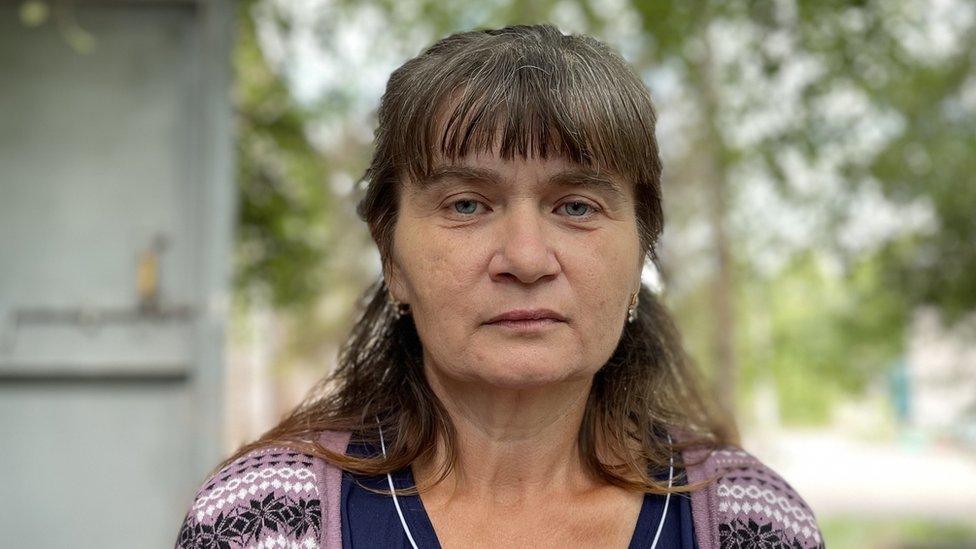Ukraine war: President Zelensky visits city recaptured in rapid counter-offensive
- Published
Watch: Zelensky visits retaken Ukrainian city of Izyum
President Volodymyr Zelensky has been to the recaptured city of Izyum, a key logistics hub in north-eastern Ukraine.
During his visit, Mr Zelensky thanked troops who took part in the counter-attack against Russian occupiers.
He oversaw a flag-raising ceremony and said the Ukrainian flag would return to every city and village in the country.
Ukrainian officials say they are targeting towns in the eastern Donbas region after making a series of gains in a rapid counter-offensive.
In recent days, Ukraine's army has reclaimed swathes of occupied territory, forcing Russian troops to retreat.
In a late evening address on Tuesday, Mr Zelensky said his forces were fortifying their hold over 8,000 sq km (3,088 sq miles) of retaken territory in the Kharkiv region.
Last Thursday, President Zelensky said Ukrainian forces had retaken 1,000 sq km. By Sunday, Ukraine's figure had tripled to 3,000 sq km, before rising again to 6,000 sq km.
The precise scale of Ukraine's gains has not been verified by the BBC.
Mr Zelensky vowed to take back all Ukrainian territory still occupied by Russian forces - he said he did not know when this would happen, but that "truth is on our side".
Meanwhile, the Russian military is deploying so-called barrier troops in Ukraine to prevent its own units from fleeing, according to Ukrainian military intelligence.
Ukrainian defence officials said that according to intercepted conversations, "panic" and "refusals to fight" are setting in among Russian troops.
Elsewhere in Ukraine, officials accused Russian forces of targeting civilian infrastructure in the southern city of Kryvyi Rih on Wednesday.
Cruise missiles fired at the city's "hydraulic structures" caused water levels in a nearby river to rise and threatened local drinking supplies, Ukrainian authorities said.
Responding to the attack, Mr Zelensky described Russia as a "terrorist state" that was trying to "flood Kryvyi Rih".
"All the occupiers can do is to sow panic, create an emergency situation, try to leave people without light, heat, water and food. Can it break us? Not at all. Will they face a fair response and retribution? Definitely yes," the Ukrainian president said.
In the US, President Biden said Ukraine had made "significant" gains.
He said it was "clear" that the advance had enjoyed success, but cautioned that the offensive "could be a long haul".
While Russia still controls around a fifth of Ukraine's territory, towns in the Donbas that fell early in the war are now the focus of Kyiv's advancing forces.
After failing to capture cities across the country, including the capital, Kyiv, Russia is focusing on the Donbas - parts of which were already under the control of Russian-backed rebels before Russia launched its invasion this year.
Andrey Marochko, military commander of the self-declared Luhansk People's Republic - one of two regions that make up the Donbas - told Russian state media that fighting had reached the borders of the territory.
And Serhiy Haidai, the exiled Ukrainian head of the Luhansk region, said Ukrainian forces were engaging Russian troops on the outskirts of Lyman.
"There are fierce battles in Lyman now, which I think will last a few more days," Mr Haidai said in a Telegram post.
Lyman fell to Russian forces after a protracted battle at the end of May. It sits less than 150 km (93 miles) away from the city of Donetsk, the capital of the self-declared Donetsk People's Republic.
Its capture was a coup for Russian troops, giving Moscow control over a key east-west highway.
In other areas, Ukrainian forces are said to have reached the Russian border, and Mr Hayday said their capture of two towns - Izyum and Kupiansk - could see supply lines to the Russian-held cities of Severodonetsk and Lysychansk severed.
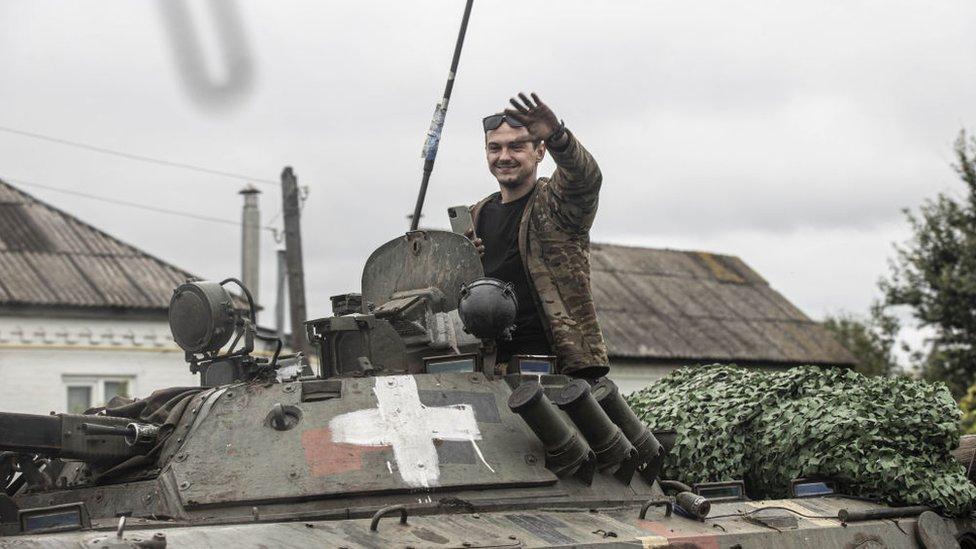
The speed and scale of Ukraine's advance appears to have taken Russia by surprise
As Kyiv's forces move into previously occupied areas, allegations of Russian war crimes have started to emerge.
Locals in the town of Balakliya told the BBC that Russian troops had tortured civilians at the town's police station during their occupation, while others recounted being electrocuted while in detention.
The Kremlin has admitted that its forces have left some eastern towns, but refused to call it a retreat, instead insisting that its forces were regrouping.
On Monday, Moscow insisted that it would press on with its invasion "until all the goals that were originally set are achieved".
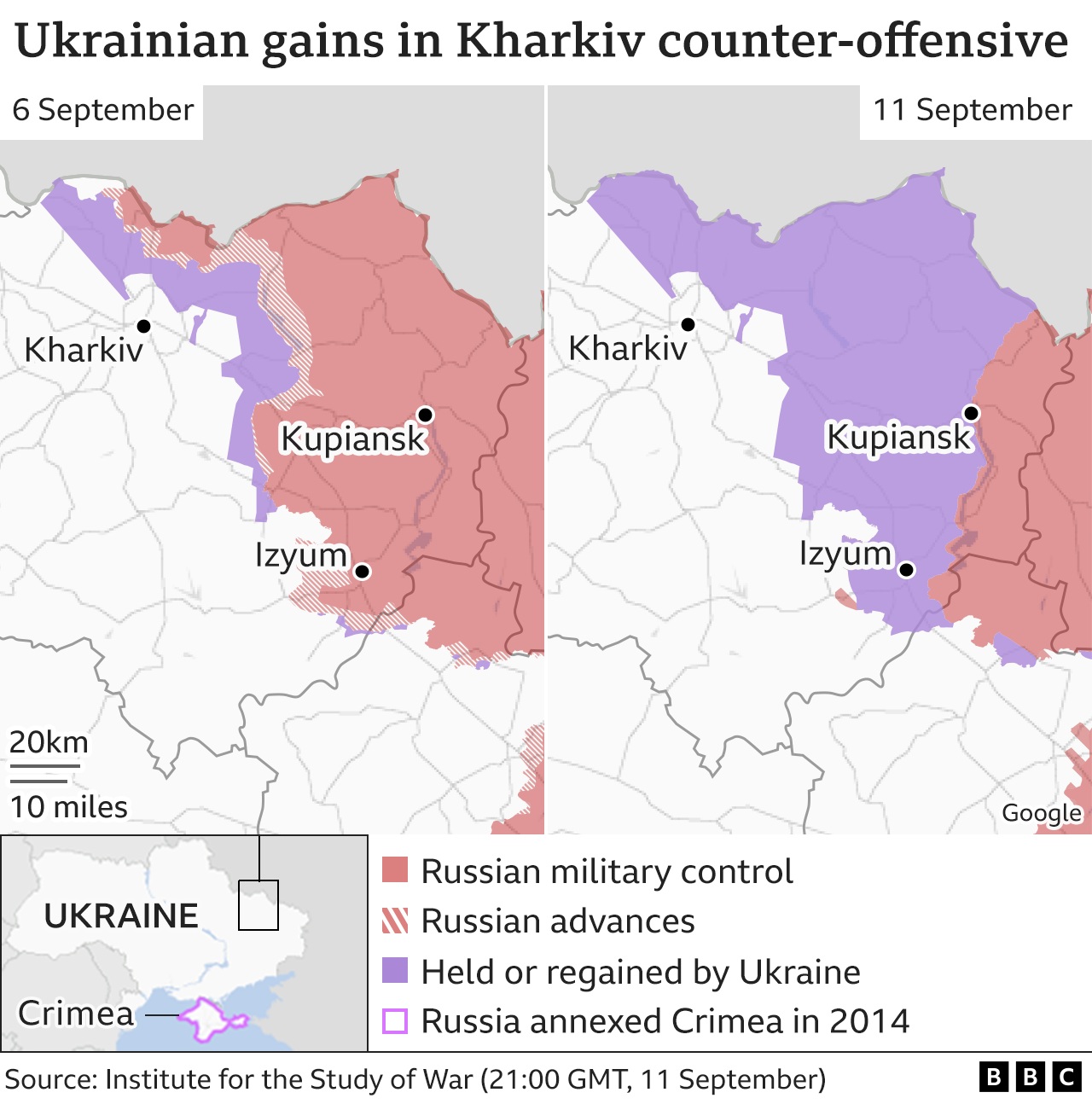
But the pace of the Ukrainian advance appears to have taken Russian forces by surprise, with reports of some of Moscow's forces abandoning their uniforms to blend in with civilians.
In some areas, Russian teachers who moved to Ukrainian towns and cities after Moscow seized control were left behind by the retreating troops.
An unspecified number have now been detained by Ukrainian forces and Deputy Prime Minister Iryna Vereshchuk has warned that they will face charges.
Meanwhile, German Chancellor Olaf Scholz urged Russian President Vladimir Putin to re-enter negotiations with Ukraine as soon as possible during a 90-minute phone call on Tuesday.
A German government read-out of the call said Mr Scholz urged Mr Putin "to find a diplomatic solution as soon as possible, based on a ceasefire, a complete withdrawal of Russian troops and respect for the territorial integrity and sovereignty of Ukraine".
Watch: The BBC's Ros Atkins on… Ukraine’s fightback
- Published12 September 2022
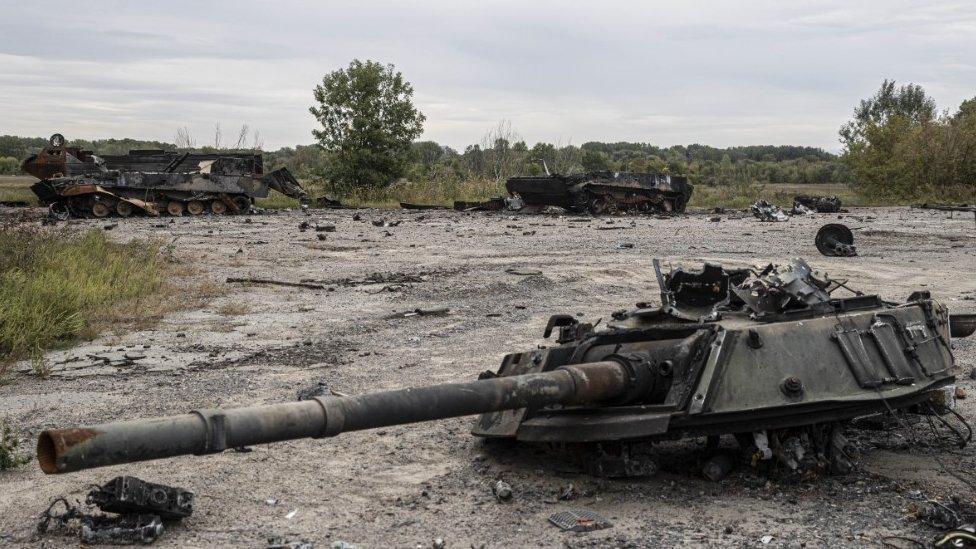
- Published13 September 2022
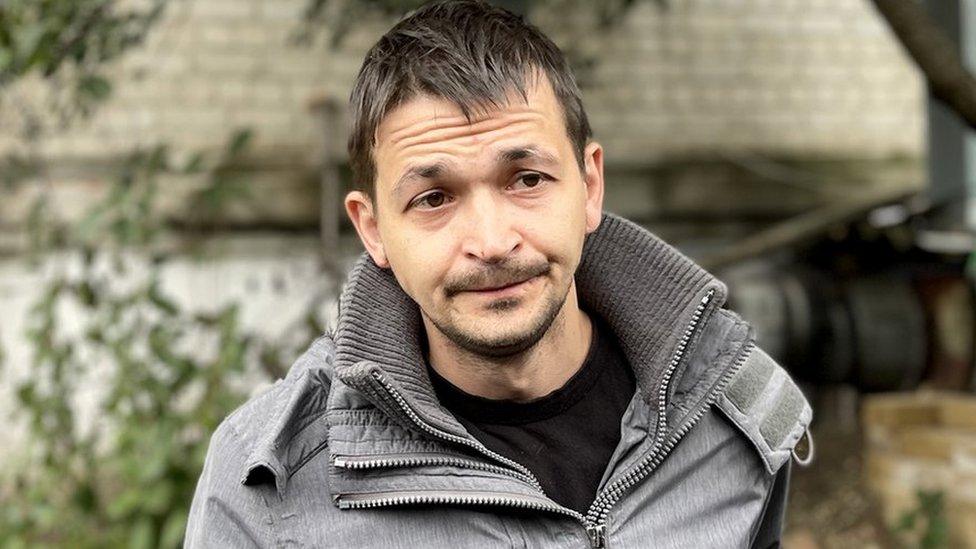
- Published11 September 2022
